News & Events
Student Central
ALERT Student-Led Webinar on Thursday, December 1st November 30, 2016
We will be holding our first ALERT Student-Led Webinar on Thursday, December 1st from 11:00 – 12:00pm EST. This webinar is part of the ALERT Skill-Builder Webinar Series, and will be led by two of our ALERT students, Amanda Figueroa and Matthew Tivnan, who will present on state-of-the-art tools and techniques that have influenced their research processes.
Please find more information about the speakers and presentation topics below:
“Cleaning Validation with Quantum Cascade Laser Spectroscopy”
Amanda Figueroa, M.S., Physical Chemistry, University of Puerto Rico Mayagüez
Abstract: How to use and apply chemometrics by PLS Toolbox (Matlab based platform) to extract infrared signals from microorganisms and pharmaceutical traces of compounds. This is highly applicable to bioterrorism, biomedical and manufacturing scenarios since bacterial contamination is an urgent public health issue that needs to be monitored. I will discuss simple examples of how we are able to quantify and distinguish microorganisms in a way that is user-friendly to untrained personnel.
“Microwave Imaging in Biological Tissue”
Matthew Tivnan, BS, Electrical Engineering and Physics, Northeastern University
Abstract: Numerical optimization techniques with a focus on Engineering research applications. Specific topics covered include cost functions, gradient descent, newton’s method, and stochastic techniques.
This is a closed event for the ALERT Community. If you are an ALERT Community member and would like to attend, please contact Melanie Smith at [email protected] for information on how to connect.
RAND 2017 Graduate Student Summer Associate Program November 30, 2016
DHS’s new Federally Funded Research and Development Center (FFRDC), the Homeland Security Operations Analysis Center (operated by Rand) sponsors a Graduate Student Summer Associate Program at RAND. All applications are due January 5, 2016.
This program provides a great opportunity for graduate students across the Centers of Excellence to explore a career serving the Homeland Security Enterprise through FFRDC research and analysis. The program is designed for full-time students who have completed at least two years of graduate work leading to a doctorate or professional degree. Further details about the program and eligibility criteria are described on our Graduate Student Summer Associate Program website.
This year’s application instructions are listed on the program website.
Student Spotlight: Christian Sorensen November 1, 2016
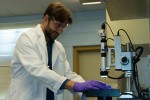
Christian Sorensen, a Ph.D. student in Mechanical Engineering at Purdue University, is our newest participant in the ALERT DHS HS-STEM (Homeland Security Science, Technology, Engineering, and Mathematics) Science and Engineering Workforce Development Program (SEWDP). Christian began his graduate program at Purdue this fall, and is working with ALERT researcher, Prof. Steven Son. His research project is focused on how to better predict the threat of characterized ammonium nitrate-based homemade explosives. When asked what he is most passionate about when it comes to his research, he stated, “I’m interested in the aspects that lead to tools or procedures for public safety, while also gaining the knowledge base necessary to study future threats and provide expert technical knowledge about current explosive hazards.”
Christian’s involvement in Homeland Security began when he served as a Team Leader of the Explosive Ordnance Disposal (EOD) in the U.S. Air Force, where he gained first-hand experience of explosives threats. After leaving active military duty, he then went on to attend the New Mexico Institute of Mining and Technology (NMT), to obtain a B.S. in Mechanical Engineering with the Highest Honors in 2015. After graduating, Christian worked as a post-baccalaureate research assistant at Los Alamos National Laboratory (LANL), where he eventually taught military EOD technicians various explosives detection techniques through LANL’s Advanced Home Made Explosives course.
Of his experience working with Christian so far, Prof. Son expressed that, “Typically graduate students that join my group have very little experience with explosives. However, Christian comes to our group with many years of experience in the Air Force, as well as a year of research experience at Los Alamos National Laboratory. His experience is proving to be to be a great benefit to our group. For example, he did a demonstration for my energetic materials combustion class based on what he learned at Los Alamos teaching first responders. We expect great things from Christian and very much appreciate his ALERT support.”
As for his future plans to work within the Department of Homeland Security enterprise, he would like to return to LANL to work on high explosive science with an emphasis on better understanding ‘non-standard’ explosives (i.e. those not used by the military or in the commercial sector), and says he would also like to reprise his teaching role for military EOD technicians.
ALERT / Gordon-CENSSIS Scholar Application Reminder September 19, 2016
The ALERT / Gordon-CENSSIS Scholar Application deadline is quickly approaching. All applications are due by Wednesday, September 28th. The program will run from October 2016 – April 2017.
The ALERT and Gordon-CenSSIS Scholars Program is designed to provide freshmen engineering students the opportunity to get involved in ALERT and Gordon-CenSSIS research projects, K-12 STEM (Science, Technology, Engineering, and Math) outreach programs, and professional development training and seminars, such as Leadership Skills, Research Ethics, and Presentation and Poster Building Skills.
Visit the General Information Page for more about the Scholars Program.
The Application Form can be downloaded here: Application Form.
Submit applications to Melanie Smith via email to [email protected]. Please use the subject line: “ALERT and Gordon-CenSSIS Scholars Application Submission.”
Student Spotlight: Matthew Tivnan August 29, 2016
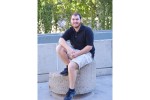
Matthew Tivnan, a senior undergraduate in Electrical Engineering and Physics at Northeastern University, is our first undergraduate student to participate in the ALERT DHS HS-STEM (Homeland Security Science, Technology, Engineering, and Mathematics) Science and Engineering Workforce Development Program (SEWDP).
The Science and Engineering Workforce Development Program was previously known as the Career Development Program (CDP), and was established in 2011 with a grant to Northeastern University from the Department of Homeland Security, Science and Technology Directorate. In 2015 the program was expanded, and now awards fellowships to full-time students pursuing BS, MS or PhD degrees related to ALERT’s research. After completing their degree and other program requirements, graduates are required to obtain paid employment within the Homeland Security Enterprise for at least one year.
During his time at Northeastern, Matt has worked with Prof. Carey Rappaport on a project focused on the Microwave Radar Imaging in Biological Tissue, which can be used to detect surgically implanted explosives and breast cancer tumors. By studying the scattering of electromagnetic waves in biological tissues he designs advanced imaging algorithms for the detection and localization of dangerous targets.
Although he applied to Northeastern with the intent of studying music, Matt quickly changed majors to Electrical Engineering, and began working with Prof. Rappaport his freshmen year when he participated in the ALERT and Gordon-CenSSIS Scholars Program. His involvement since has only increased, as he became a summer REU participant, an ALERT and Gordon-CenSSIS Mentor, and is now part of the SEWDP. Last spring, Matt spent his co-op working for Photodiagnostic Systems Inc. (PDSI), a Massachusetts-based company founded and chaired by Bernard M. Gordon, which makes advanced imaging systems for medical and security applications. As an Apprentice Imaging Engineer, he spent his time there working on PET (Positron Emission Tomography) scatter correction algorithms, wrote a 2D projection algorithm using 3D CT (Computed Tomography) data, designed a 3D dynamic balancing procedure for a rotating CT disk, and helped build several CT scanners from the ground up.
When asked how his co-op experience shaped his career goals and what his plans are for the near future, he says, “At PDSI, I learned about a great option for a career I would really enjoy. I’m planning to take a year after I graduate in May 2017 to work in industry, and am looking for a position where I can work on advanced imaging technology. After that, I’m hoping to continue on to graduate school.”
ALERT REUs Present Summer Research August 29, 2016
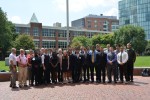
This summer, ALERT hosted three undergraduate students at Northeastern University to participate in a 10-week Research Experience for Undergraduates program. The ALERT REU program at NEU is partnered with other REU programs in the university’s College of Engineering, and builds a cohort of motivated students who attend professional development meetings and program activities, including presentations on Research Ethics, Lab Safety, PowerPoint Presentation Skills and Scientific Storytelling. At the end of the summer, each REU gives a final presentation of their research project. The presentation addresses the project’s overall mission and endeavors, the REU’s specific contributions to the project, as well as what knowledge and skills they gained through the process. This year’s students worked on projects related to ALERT’s Bulk Sensors & Sensor Systems research.
REU Anthony Bisulco (’18) is a third year NU student who worked with Professor Jose Martinez-Lorenzo on ALERT’s Rapid Security Threat Detection via MIMO (Multiple Input, Multiple Output) Millimeter Wave Imaging project.
In his words, “The main purpose of my REU project is to improve the overall passenger experience during the airport security screening process. Currently, this process is plaqued with many downfalls such as slow throughput, frequent false alarms and significant passenger divestment and recollection. The working goal of the project I am working on is to improve this process by creating ‘On the Move Screening’ where passengers walk at a normal pace through what appears to be a tunnel without the need to divest any clothing or personal items.”
Anthony’s project worked to increase the image quality of a 3D imaging millimeter wave radar (“Tunnel System”) with the goal of improving the system’s threat detection capability. “One part of this radar is various transmitters/receivers which illuminate/receiver the target (Human Torso) at various angles. As a result of adding transmitters/receivers the image quality is increased. Rather than adding multiple transmitters or receivers, my project added microwave switches to the system, which is the equivalent of adding more transmitters and receivers for imaging. Overall, I mainly designed the system for controlling these switches and developed some algorithms for optimizing the best imaging positions.”
Spencer Pozder (‘19) and Justin Xia (‘19) worked with Professor Carey Rappaport on Feasibility Investigations in Multistatic Imaging Techniques for their Research Experience. Currently, active millimeter wave radar is used for imaging objects concealed on the human body at airport security checkpoints. The current monostatic configurations are unable to accurately image objects at certain angles, give lower resolution, cost more, trigger more false alarms and have longer execution times. ALERT is interested in a multistatic configuration in an “On the Move” scanning system, capable of receiving image information from multiple angles in parallel, possibly increasing resolution and accuracy of the images produced.
The team developed a product using hardware from ALERT Industrial Partners, Rapiscan and Analog Devices, creating a functional system and imaging algorithm capable of reconstructing images. They also redesigned and relocated transmitter and receiver boards to accommodate the optimized system configuration and designed mechanical structure for holding transmitters and receivers. The “On the Move” system is currently being prototyped and patented.
In addition to this program, ALERT partner universities, including the University of Puerto Rico at Mayagüez and Notre Dame, also hosted summer REU participants in their labs.
The REU program is hosted and sponsored by the Awareness and Localization of Explosives-Related Threats (ALERT) Department of Homeland Security Center of Excellence, and the Bernard M. Gordon Center for Subsurface Sensing and Imaging Systems (Gordon-CenSSIS), a Graduated National Science Foundation Engineering Research Center.
ADSA15: Save the Date! August 19, 2016
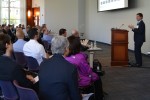
The Fifteenth Advanced Development for Security Applications Workshop (ADSA15) will be held on November 15th and 16th at Northeastern University in Boston, Massachusetts. The title of the workshop will be “Next Generation Screening Technologies and Processes for the Checkpoint.” This workshop is a continuation of ADSA12, ADSA13, and ADSA14. The workshop is being convened by the DHS Center of Excellence (COE) for Awareness and Localization of Explosives-Related Threats (ALERT).
Presentation and panel discussions will address the following topics:
- Emerging hardware and algorithms
- Concepts of operations
- Protecting soft targets
- Data analytics – application to aviation security
- System architectures
- Business aspects of fusion
- Funding, innovation and deployment models
For more information on the ADSA workshops, visit our ADSA Workshop Page
This workshop is by invitation only.
If you are interested in learning more, or receiving an invitation, please contact Melanie Smith at [email protected].
REMINDER: White Paper Submissions Due 7/1/2016 June 30, 2016
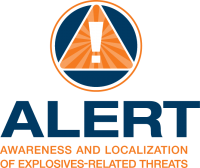
REMINDER: ALERT White Papers are due TOMORROW. Submissions will be accepted until July 1, 2016, 11:59pm local time.
Pursuant to the goals of DHS Science and Technology (S&T) Directorate, Office of University Programs (OUP), the ALERT Center of Excellence (COE) is accepting white paper submissions for research and transition projects in 2016 and beyond. The COE seeks end-user focused projects that conduct transformational research, develop technology, and provide educational development to improve effective characterization, detection, mitigation and response to explosives-related threats facing the country and the world.
This call will consider white papers for projects ranging from fundamental research through transition to the security enterprise (government, private sector). Submissions must document the problem, describe the gaps that exist, and how their project will address the gaps to protect the public from explosives-related threats. ALERT plans to fund approximately four awards for up to two years at $60,000 to $100,000 per year.
The Call for White Papers is available here: https://alert.northeastern.edu/?p=4738.
Any questions should be directed to [email protected].
Feel free to forward this announcement to others.
Read MoreALERT 2016-2017 Call for White Papers June 2, 2016

White Papers are due by July 1, 2016, 11:59pm local time.
Pursuant to the goals of DHS Science and Technology (S&T) Directorate, Office of University Programs (OUP), the ALERT Center of Excellence (COE) is accepting white paper submissions for research and transition projects in 2016 and beyond. The COE seeks end-user focused projects that conduct transformational research, develop technology, and provide educational development to improve effective characterization, detection, mitigation and response to explosives-related threats facing the country and the world.
This call will consider white papers for projects ranging from fundamental research through transition to the security enterprise (government, private sector). Submissions must document the problem, describe the gaps that exist, and how their project will address the gaps to protect the public from explosives-related threats. ALERT plans to fund approximately four awards for up to two years at $60,000 to $100,000 per year.
The Call for White Papers is available here: https://alert.northeastern.edu/?p=4738.
Any questions should be directed to [email protected].
Feel free to forward this announcement to others.
Read More5/19 – DHS S&T Center of Excellence Technology Showcase May 9, 2016
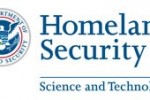
Registration is open!
Date: May 19, 2016
Time: 9:00 am – 4:00 pm
Location: Washington, DC
The DHS Science and Technology Directorate (S&T) Office of University Programs and Stevens Institute of Technology invite you to attend the Spring 2016 Centers of Excellence(COE) Technology Showcase May 19, 2016 open 9:00 am- 4:00 pm.
Explore tools and technology or talk to experts in:
Border Security – Explosives Detection – Risk and Economic Analysis – Natural Hazards – Data & Visual Analytics – Food Defense – Terrorism Studies – Animal Disease Defense – Maritime and Arctic Security – Critical Infrastructure Resilience – Training Opportunities – Hosting Interns – Working with the COEs
- Experience demonstrations of COE tools, technologies, knowledge products
- Connect with university experts (one-on-one if desired) to discuss pressing challenges
- Develop new collaborations to support homeland security missions
- Meet the newest COEs focused on Arctic security; critical infrastructure resilience; and borders, trade and immigration
- Learn how to bring interns and professional development opportunities to your office
See the list of analytical tools that will be showcased on the registration website.
This event is free and open to the public. Please feel free to forward this invitation.
Hosted by Stevens Institute of Technology
Ronald Reagan Building and International Trade Center
Suite G-17
1300 Pennsylvania Ave NW
Washington, DC 20004
Centers of Excellence are a DHS Science and Technology Directorate program managed by the Office of University Programs.
For more information on COEs, visit the Virtual Showcase or email [email protected].
If the registration link above does not work for you, try copying and pasting this into your browser:
